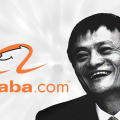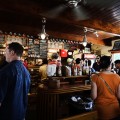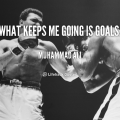 Years ago I heard an unbelievable story about a young entrepreneur who wanted to buy an island, but didn’t have enough money to do so. The man was so desperate to impress the girl that he had fallen for, that even though he knew that his was a no-win situation, he called the realtor and convinced him to show him and his girlfriend the island. They flew there together and spent some time enjoying the paradise without spending a penny.
Years ago I heard an unbelievable story about a young entrepreneur who wanted to buy an island, but didn’t have enough money to do so. The man was so desperate to impress the girl that he had fallen for, that even though he knew that his was a no-win situation, he called the realtor and convinced him to show him and his girlfriend the island. They flew there together and spent some time enjoying the paradise without spending a penny.
The realtor finally quoted a price of $6 million for the island, but the young entrepreneur could offer only $100,000. The broker immediately became impatient and rejected the offer, and left the young couple high and dry to find their way back home.
When I first heard that story, I didn’t believe it. I thought that no one could be so arrogant as to fly to the island without any money and pretend with absolute confidence that he wanted to buy it. But recently, while reading the book “Losing My Virginity”, the biography of Richard Branson, I was surprised to discover that this seemingly unbelievable story is actually contained in one of the chapters in his book.
After reading the entire book full of go-getting stories and bold business decisions, I was no longer surprised. The Virgin Group was a company created by a truly extraordinary man — Sir Richard Branson. Today, I would like to share with you a SWOT analysis of Branson’s most successful undertaking.
A risk-taking leader
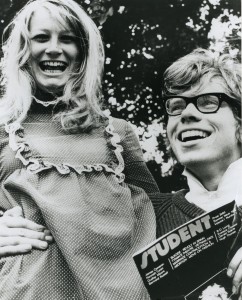
The road to Virgin’s success began when Richard Branson created his first business venture — a magazine called ‘The Student’. To help fund his magazine, he started yet another venture — a mail-order record company called ‘Virgin Records’, and soon set up his recording studio in a country estate that he had purchased. Branson was always following his gut feelings and ideas, taking risks and developed his company with dedication step by step. He transformed the business model many times; he pushed the company through transitions from LPs to cassettes and CDs; from small shops to mega stores. In the end, in 1992, he sold his venture to EMI for £500 million.
However, Branson never limited his actions to one company or idea and was always ready to seize more opportunities. In 1984, when an acquaintance approached him with the concept of the transatlantic airline, Branson without hesitation started a company that was later named Virgin Atlantic. Probably, his decision was influenced by a surprising event that happened not long before.
He was on his way with his future wife Joan to Puerto Rico, but unfortunately, their flight was canceled. He wanted to be on the island that night so badly, that he started calling around about chartering a plane, even though he didn’t have enough money to charter an entire aircraft. He went over to all the people who had had their flight canceled with him, and offered them a seat for $39. He sold off the rest of the seats, and quickly was able to hire an entire plane.
Branson not only reached his destination that day but also tested his MVP (Minimum Viable Product) idea for an airplane business when Eric Ries, the author of the famous Lean Startup was only six years old.
Sky is NOT the limit
Richard Branson is known across the globe not only as the entrepreneurship icon, but also as a man who lives his life to the fullest. His sporting achievements, notably the record-breaking Atlantic crossing in the Virgin Atlantic Challenger II in 1986, and the first crossing by a hot-air balloon of the Atlantic (1987) and Pacific (1991) showed that he is willing not only to risk his money but also his life.
For Branson, even the sky is not the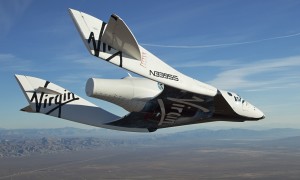 limit. The hottest company in Branson’s travel portfolio is Virgin Galactic, the space travel company that claims it will soon start transporting tourists into sub-orbital space, at a price of $250,000 per person. Even though the company hasn’t yet successfully tested their spaceships, more than 700 people — including Hollywood celebrities Angelina Jolie, Brad Pitt, Tom Hanks and Leonardo DiCaprio — have bought tickets for Virgin Galactic space voyage flights.
limit. The hottest company in Branson’s travel portfolio is Virgin Galactic, the space travel company that claims it will soon start transporting tourists into sub-orbital space, at a price of $250,000 per person. Even though the company hasn’t yet successfully tested their spaceships, more than 700 people — including Hollywood celebrities Angelina Jolie, Brad Pitt, Tom Hanks and Leonardo DiCaprio — have bought tickets for Virgin Galactic space voyage flights.
Branson is not only the unquestioned leader and creator of Virgin Group success, but also he seems to be a magnet for new business opportunities. However, on the other hand, sometimes the biggest assets can also be the biggest threats.
From the results of SWOT analysis, we can clearly see that the greatest weakness of the Virgin Group is that it depends heavily on the image of its creator. The connection between Branson and the Virgin brand is so close that no one can predict what will happen with the entire group when he retires. For now, there is no appropriate successor, who even on a humbler level would be identified as a leader and promoter of the international enterprise.
The lack of new, emerging leadership might be an enormous risk for the Virgin Group in the future, which although currently is developing dynamically, is still living in the shadow of its founder.
One Brand to rule them all
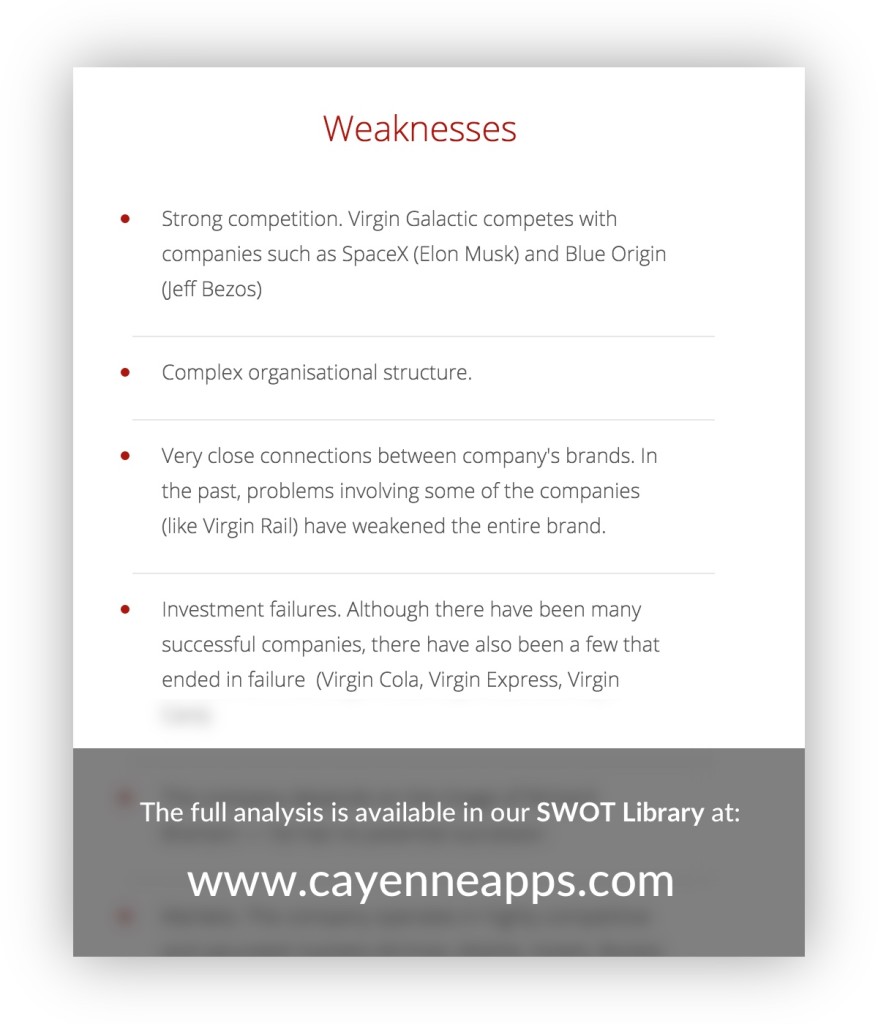
The positive influence of Richard Branson is indisputable. The Virgin Group is one of the world’s most recognized and respected brands, with over 400 companies worldwide. Many people know the Virgin brand better than the names of the individual companies within the Group because Virgin has plastered its name on everything from airlines to wine clubs and underwear.
However, there might be a hidden threat behind this powerful brand. The risk becomes more apparent when we look at the level of Virgin’s diversity. Branson’s brand is involved in planes, trains, music, mobile phones, holidays, finance, wines, publishing, space tourism, cosmetics, stores and more. Because of this widespread exposure, we can expect that it might at one point be considered as too diluted through its overuse. Such comprehensive utilization of the Virgin logo also has other consequences. If one of the companies will fail, the entire brand might be weakened, which has already occurred in the past.
Lesson learned from failures
The mantra of “Think Big” or “Screw it, let’s do it” often leads to great success, but occasionally causes major failures. In the past, the Virgin Drinks company which was a producer of Virgin Cola failed because of the serious competition of the Coca-Cola and Pepsi. The Virgin Pulse and Virgin Digital companies which were created to compete against the iPod and iTunes lasted only a year. The Virgin Brides closed after one year, even though Branson shaved and wore a wedding dress for its promotion.
These examples show that Virgin companies not only operate in highly competitive and saturated markets (airlines, mobile, hotels, books) but also need to face robust competition on its way. In the past, this tug-of-war has exposed the fact that in some fields the competition is tough and does not respect rules of fair-play, in other fields it involves the best of the best.
Competition
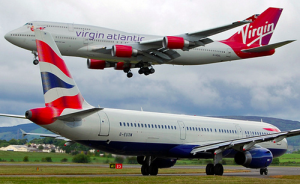 In the early 1990s, Virgin Atlantic have a battle with British Airways, which viewed Virgin as an emerging competitor. Virgin subsequently accused British Airways of poaching its passengers, hacking its computers, and leaking stories to the press that portrayed Virgin negatively. In the end, British Airways settled the case, giving £500,000 to Branson, a further £110,000 to his airline, and had to pay legal fees of up to £3 million.
In the early 1990s, Virgin Atlantic have a battle with British Airways, which viewed Virgin as an emerging competitor. Virgin subsequently accused British Airways of poaching its passengers, hacking its computers, and leaking stories to the press that portrayed Virgin negatively. In the end, British Airways settled the case, giving £500,000 to Branson, a further £110,000 to his airline, and had to pay legal fees of up to £3 million.
Now, Virgin Galactic competes with companies such as SpaceX founded by Elon Musk of PayPal and Tesla, which recently became the first privately-owned group to launch a mission to the International Space Station, Blue Origin, founded by Amazon CEO Jeff Bezos or John Carmack’s Armadillo Aerospace.
As examples above showed, when the company wants to be a leading participant in the race, there is no room left for mistakes, treating opponents leniently or slowing down internal development or innovation processes.
Future
Richard Branson used to say that if somebody gives you an amazing opportunity but you are not sure you can do it, say yes – then learn how to do it later. The result of the SWOT analysis and the defensive strategy suggest that the following action plan for the company should concentrate more on removing recognized weaknesses than seizing opportunities that present themselves.
Virgin Group still has a lot of strengths, and the company’s future might look bright provided that its current leader faces the biggest question of all: who could be the appropriate successor to Richard Branson?
As usual, an editable copy of Virgin Group SWOT analysis can be found in the SWOT Library, in CayenneApps SWOT application. Visit CayenneApps SWOT library!


